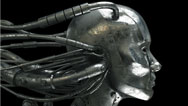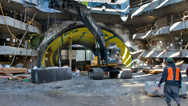Cryonics
- By Anna Rothschild
- Posted 11.07.13
- NOVA
Since 1972, a company called Alcor has been preserving legally dead people at very low temperatures. The hope is that, in the future, scientists will be able to revive these "patients," giving them a chance for eternal life. It may sound like the stuff of science fiction, but host David Pogue met with Alcor president and CEO Max More to tour the facility and learn about the field of "cryonics."
Transcript
Cryonics
November 07, 2013
NARRATOR: Near the hot desert just outside of Phoenix, Arizona is a company called Alcor. Despite the high temperature outside, within, over 100 human bodies are being preserved at very low temperatures. Host David Pogue met with the president and CEO Max More to learn about the field of cryonics.
DAVID POGUE: So who’s in this gallery here?
MAX MORE: These are some of our patients. We call them patients because we don’t regard them as dead people. The idea is that what we call death today is somewhat of an arbitrary line. Really it’s today’s doctors giving up and saying, “There’s nothing more I can do for this person and I’m letting them go.” What we’re doing is we’re saying, “Let’s not quit there. Let’s give the future a chance to bring these patients back.”
NARRATOR: More doesn’t promise that he’ll be able to bring any of his patients back, but he says that the chances are pretty good.
MAX MORE: Already we’re seeing the field of regenerative medicine just burgeoning. We’re already starting to replace organs and grow organ parts. And I think over the next 20 years we’re going to see some amazing developments. So, pretty much any organ in the body will be replaceable. Either with one biological grown from your own tissue, or perhaps a synthetic organ.
NARRATOR: After an Alcor member is declared legally dead, the patient is immediately placed in an ice bath. Then the Alcor team restores respiration to make sure oxygen continues to flow to the brain until the body is cryopreserved. In fact, certain patients choose to preserve their heads alone. Ted Williams, the baseball star, is a famous Alcor “neuro-patient.”
DAVID POGUE: But here’s the part I don’t get. Suppose medical science does advance as you hope, and in 75 years they can revive this decapitated head. You don’t have a body anymore!
MAX MORE: Well, this is the way I look at it. I personally am a neuro member myself. I’m not taking along my body. My reasoning being that by the time I need this, my body’s going to be a disaster area. So in my view, if you have the technology that can repair a hundred billion damaged neurons, replacing this part is going to be pretty easy by comparison. But we leave that choice to our members.
So let me show you the patient care bay.
DAVID POGUE: Patient care bay?
MAX MORE: Yes, this is where we have currently 117 patients. The oldest being Professor James Bedford who was cryopreserved back in 1967.
DAVID POGUE: Wow. Oh my gosh. This is very sci-fi.
MAX MORE: It’s not quite as sci-fi as in the movies where they always have a little frosty face behind a glass plate. You can’t really do that. But, here in these large dewars we have four whole body patients and we can also fit five neuro patients in the central column.
DAVID POGUE: There’s people in those cans.
MAX MORE: That’s right.
NARRATOR: The bodies are wrapped in a sleeping bag to protect the skin from direct exposure to liquid nitrogen. Each one is held in its own aluminum compartment within the can.
DAVID POGUE: So if we could see through these, we would see people just kind of floating like this? Or…
MAX MORE: You’d see the aluminum pod, and inside they’re actually head down so…
DAVID POGUE: Head down?
MAX MORE: So that the head would be the last thing to be exposed.
DAVID POGUE: So are these heavily insulated? Are these basically giant thermoses?
MAX MORE: Exactly. Just room temperature. A little bit cool to the touch. Inside is extremely cold. Minus 196 C, minus 320 Fahrenheit.
DAVID POGUE: You must get some strong reactions from people when you tell them what you do.
MAX MORE: Especially when they don’t really understand it. They think there’s some kind of strange, creepy thing where you’re freezing people. Why would you do that? But once they understand that really it’s an extension of critical care medicine—it’s just picking up at the point where the day’s medicine gives up on people—it makes a lot more sense. When they see patients in hospitals being taken down 10 degrees C to slow down metabolism while they do brain surgery, it starts to make sense. When they look at the research into organ cryopreservation, the goal being to actually build an organ bank and keep a stock of organs rather than having to match them across the country very rapidly, it starts to make sense. It’s certainly speculative. It’s certainly not guaranteed. We’re not sure it’s gonna work, but it’s not crazy. It’s a shot. It gives you a chance.
NARRATOR: And as for Max More?
DAVID POGUE: You would live forever?
MAX MORE: I don’t like to use the word “forever,” because forever is a very long time. There might be the heat death of the universe, the Sun might explode in a few billion year, who knows. But indefinite life span I’m talking about. Really changing death from being compulsory to making it an option. So, you know, check back with me in a thousand years and ask me if I’ve had enough.
NARRATOR: Til then, More will be at Alcor. Well, at least his head will.
Credits
PRODUCTION CREDITS
- Director
- Vincent Liota
- Associate Producer
- Karinna Sjo-Gaber
- Camera
- Jason Longo
- Sound
- Rusty Duggan
- Editor
- Anna Rothschild
- Narrator
- Anna Rothschild
- Original Footage
- © WGBH Educational Foundation 2013
IMAGE
- (main image: Alcor Facility)
- © WGBH Educational Foundation 2013
Related Links
-

Making More Stuff
Host David Pogue hits the road to explore the frontiers of invention and innovation.
-

The Pursuit of Immortality
Humans haven't found a way to counteract or block the effects of aging, but we've tried. See how in this time line.
-

Melting to Keep Cool
By exploiting thermodynamics, phase-change materials like ice, salt, and wax save energy and help keep us cool.
-

Engineering with Ice
Artificial ground freezing is enabling engineers to complete ever more daring projects.

